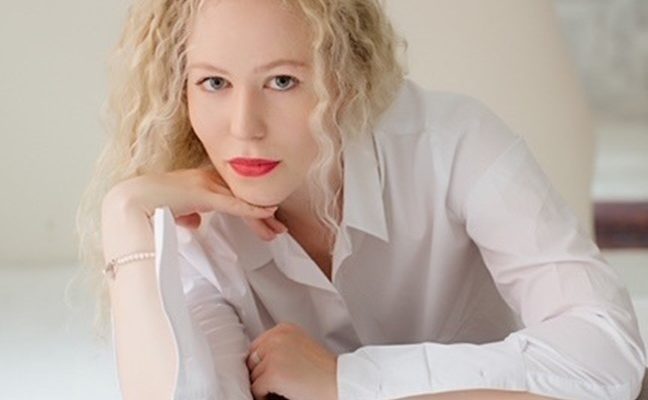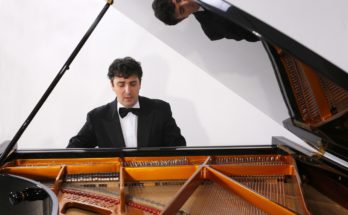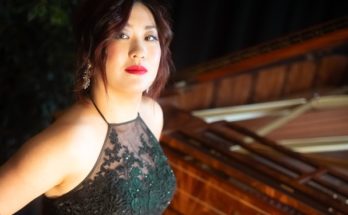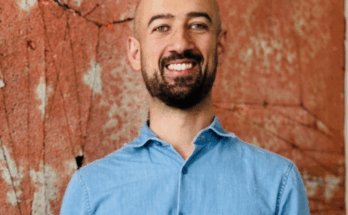This time PianoMe caught up with Lada to talk about what it means to be a music teacher and also about the main challenges faced by international music students in Germany. We also spoke about her consultations for musicians on education and career development in Europe, and she told us why she likes PianoMe’s idea.
PianoMe (PM): Dear Lada, thank you very much for your time! It is a great pleasure for us that you are ready for an interview with PianoMe!
Lada Shornik (LS): Thank you so much for the invitation! It’s great to be here with you and your readers today.
PM: That’s great, thank you! First of all, we would like to briefly introduce you to our readers, even though many of them probably already know who you are. As an opera singer with over 10 years of stage experience, you have extensive performance experience in both musical theatre and chamber music. You are also a vocal coach and cultural manager, and very well experienced in organizing various cultural events, including creative festivals, competitions, workshops, concerts, and educational projects. Did I forget anything? (laughing)
LS: (laughing) Oh yes, there are quite a few areas I try to express myself in. I believe it’s really important to explore different activities to understand what fits you best at a particular moment in life. I sometimes find it strange that people choose a profession at 18 and never try anything else. I’d also mention that I’m a blogger — I run two Instagram pages, one for Russian-speaking and one for English-speaking audiences.
PM: That sounds great! Can you please tell us first how you got started getting into music?
LS: I started doing musical theatre at quite a professional level from a very young age. At nine, I was accepted into the Galina Vishnevskaya Opera School in Moscow and just continued developing in that direction. Later, I studied at the Ippolitov-Ivanov College, then at the UdK Conservatory in Berlin, and more recently completed my master’s degree at HTW Saar.
PM: Your many experiences have surely shaped you into a multifaceted musician. I am wondering whether the tremendous social changes of recent years – such as the pandemic and economic crises – have changed your perspective on opera and musical works.
LS: In my view, the events of recent years have certainly influenced the musical world just as much as they have shaped society as a whole. From my own experience, the pandemic introduced a number of digital advantages that have actually changed the way we study and prepare for our careers. For example, it has become normal to work with teachers and coaches from anywhere in the world online, which has broadened access to expertise that was previously limited by geography. Auditions have also adapted: many institutions now include a video-round before inviting candidates to an in-person audition. This helps both sides – and for young musicians it means not having to invest in travel and accommodation for projects that may not be the right fit in the first place. For international applicants, online entrance exams created opportunities at a time when travelling to Europe was simply impossible. Of course, this format doesn’t fully reveal a musician’s artistry, which is why many conservatories are now returning to traditional live auditions. On a personal level, I was fortunate not to experience major losses during the turbulent period. At the time, I was still a student at the Berlin conservatory, so I was relatively protected. Interestingly, the pandemic even gave me space to start my blog about music education in Germany – something I might not have done otherwise.
Main challenges for international music students in Germany
PM: Very interesting! Apart from your work on the stage, you also have another main focus in your activities – you are a founder of Educurators, a project providing consultations for musicians on education and career development in Europe. Can you please tell us more about this project?
LS: I started this project together with my colleague and friend Farrukh. Our main motivation was to show Russian-speaking musicians that studying abroad is absolutely possible. We wanted to protect them from the mistakes we made ourselves when we moved and applied “blindly,” to share our student experiences at the time, and most importantly — to motivate and convince them that they are talented. At first, we just told our personal stories, then began offering free group webinars, saw how much interest there was, and eventually it grew into a small agency helping musicians apply to European institutions.
PM: Thank you, Lada. I really like the idea of this project. What are the main challenges for international music students in Germany? And what are the biggest cultural or linguistic challenges international music students encounter when studying in Germany?
LS: In my opinion, the main challenge is the lack of information — and unrealistic expectations about the level of music education in Germany. You can’t really call Germany a digitalized country; the cultural field here is very closed, and marketing and communication methods are far behind modern realities. So, to find reliable information about admissions, auditions, masterclasses, or job openings, you have to spend a lot of time searching for answers — and usually, only people already inside the system can provide them. Many musicians from abroad have an idealized image of German education. Of course, it depends on the specialty and conservatory, but a large percentage of my clients think that only “genius” musicians get accepted. In reality, the level of students is very diverse. Sometimes professors see potential; sometimes they simply can’t not accept someone. The key is to try — not just fantasize.
PM: Interesting! Based on your own experience: in what ways can German conservatories and universities improve the experience of their international music students? And what difficulties do international music students face when trying to integrate into local ensembles or performance opportunities?
LS: From an international student’s perspective, German conservatories could improve communication and practical support. A stronger social media presence – with regular, engaging content in English – would make essential information far more accessible. Many applicants struggle to find basic details about curricula, professors or admission requirements, which are often hidden in long German documents.
Equally important is practical career guidance. Most international students have no clear instruction on how to register as freelancers, obtain a tax number, navigate teaching regulations or understand the local professional system. As a result, many rely on unreliable word-of-mouth information or pay unnecessary fees to consultants. Offering clear explanations and basic workshops on freelancing, taxes, auditions, self-presentation and networking would significantly improve their integration and future career prospects.
PM: Are there any scholarships, funding options, or part-time job opportunities available for international music students in Germany? And what kinds of support services (academic, linguistic, psychological) are most needed by international music students?
LS: Yes, definitely. Every university cooperates with foundations and organizations that can support students financially. The most well-known scholarship available even before starting your studies is the DAAD — it’s mostly for master’s programs. Students can also work part-time, and the most common form is a Minijob. Many music students work in concert halls, theatres, or at various events. One of the frequent questions from my international students is about language — what to do if your German level isn’t high when you start your studies. Some conservatories are flexible: if they’re convinced by you as a musician, they allow you to attend German language courses in parallel until you reach level B2.
PM: By the way, musical education: Apart from your work on the stage and also as a consultant, you also teach music. How do you see the current role of the teacher in musical education?
LS: To be honest, at this stage of my life, teaching is my main focus. My first vocal teacher, Tatyana Sharova from the Ippolitov-Ivanov Institute in Moscow, treated the voice as something divine — as an energy essential to our life. When I moved to Germany, I remember singing with a very tense body, under stress, focusing on results instead of the process. The voice became a tool to achieve goals — but it actually needs something different. In vocal work, parasympathetic calmness, harmony, and body awareness are crucial. That’s why I completed advanced training in integrative voice therapy, and in my lessons, I teach students to understand and scan their bodies. It makes the process much more effective. The role of a vocal teacher, in my opinion, is to reveal the individual somatic and emotional map of each student.
Music education in Germany
PM: We’ve touched on some of your current activities, but I’d also like to ask you about your general opinion on music education in Germany. How open and accessible is the German music education system to international students? And how does practical performance training balance with theoretical studies in German music institutions?
LS: A huge advantage of the German education system is that studying at public universities is free. There are semester fees of around 350 euros, but compared to other countries, that’s really a gift for international students. Some German states charge a bit more, but if someone is in a difficult financial situation, I’m sure the university will help them find a scholarship. Another plus is that students can work even while studying full-time. Germany is a meeting place for musicians from all over the world — there are so many high-level professionals to learn from. There are internships, masterclasses, and many opportunities for additional training. There are also many competitions for young musicians, opera studios for singers, and much more. Still, I always advise young musicians to choose their university — and especially their professor – carefully. Just because someone is a professor at a conservatory doesn’t automatically mean they’re the right teacher for you.
PM: What opportunities exist for collaboration between students and professional musicians or orchestras?
LS: Not all, but many conservatories are genuinely interested in helping their students start their careers. They organize internal auditions with agents, theatre representatives, orchestras, and various music festivals. Sometimes internships or professional audition training are part of the curriculum as well.
PM: Thank you, Lada! What does networking mean in the music industry?
LS: I’d like to answer this as honestly — maybe even as bluntly — as possible, because it’s something I really want to tell musicians at the beginning of their careers. When I came to Germany, I was convinced that if I worked hard, prepared responsibly for every lesson, learned everything on time, and stayed disciplined, people would notice, praise me, and offer me performances. Meanwhile, someone else was handing out their résumé everywhere and openly saying they were looking for work or collaborations. Guess whose career moved faster? Building a network and effective communication is truly a talent and a skill — and I’d say it’s as important as professionalism itself. Please, be visible, speak openly about your ideas and goals, and connect with everyone you can — not only within your own specialty but across other areas of music as well.
PM: That sounds interesting! I’m really sorry, but I have to ask (laughing). What do you think about PianoMe and would you recommend PianoMe to musicians?
LS: PianoMe is an essential platform for every musician. We’re constantly traveling to different countries, and it’s often a real challenge to find a practice room — without this app, it would be tough. I’m especially grateful for your educational initiatives and these interviews that introduce us to such fascinating people from all over the world.
PM: Thank you, Lada! Finally, what are your aims for the future? Would you like to share any announcement with our readers?
LS: (laughing) I try to stay flexible and not make long-term plans in times of chaos. But I’ll definitely keep helping musicians achieve their dreams of studying and building careers in Europe, continue developing my vocal class, and grow as both a teacher and a performer.
PM: Dear Lada, we thank you for the interview and wish you all the best! See you again soon!
LS: Thank you so much for these thoughtful questions! I’ll be happy to help your readers apply to music universities in Germany — or simply work on their vocal technique together.
Copyright photo: @Julia Krivosheeva




